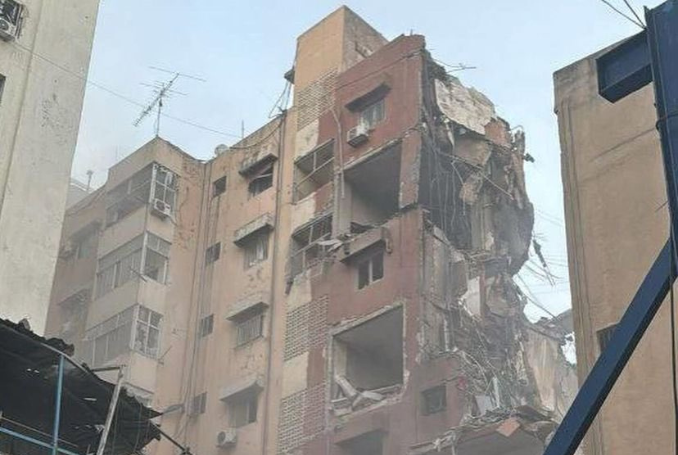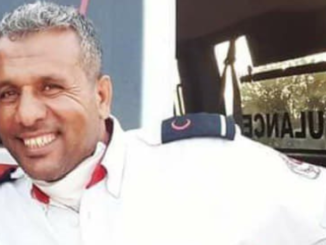
By Palestine Chronicle Editors
Hezbollah will certainly respond to the Israeli attack in a southern Beirut suburb on Tuesday, which killed several Lebanese and wounded others.
The Lebanese Resistance response is likely to be quick and decisive, for two reasons:
One, to deny Israeli Prime Minister Benjamin Netanyahu and his far-right ministers any time margins to promote any victory against the Arab resistance, whether in Lebanon or Gaza.
Two, because the Israeli government and military have been speaking about ‘retaliation’ against Hezbollah for the bombing of the town of Majdal Shams on Sunday.
The term ‘retaliation’ is placed in quotes to indicate that Hezbollah has not recognized the Israeli bombing in Beirut, with the supposed aim of assassinating a top Hezbollah official, to be an act of retaliation, simply because Hezbollah has stated repeatedly that it did not bomb Majdal Shams in the first place.
LEBANESE MEDICAL SOURCES (Citing in Al-Jazeera): 3 Killed and 25 wounded in the Israeli attack on Beirut.
FOLLOW OUR LIVE BLOG https://t.co/l84RGhP6J5 pic.twitter.com/3xLcsaslyH
— The Palestine Chronicle (@PalestineChron) July 30, 2024
Majdal Shams is a Syrian village in the Golan Heights, illegally occupied by Israel, an occupation that is recognized as illegal by the United Nations and the rest of the international community, save Washington.
This is important because if Hezbollah sees the Israeli attack as an outright aggression, it finds itself free from adhering to any ‘rules of engagement’.
According to Hezbollah, any attack on Beirut would necessitate an attack on Tel Aviv or West Jerusalem.
Failing to respond to the Israeli attack would constitute a change in the dynamics that governed the relationship between Hezbollah and Israel since the start of the war, and would allow Netanyahu to claim some kind of a victory.
Citing Israeli security sources, US media, namely the Wall Street Journal, has conveyed that Israel expects a Hezbollah response.
But will the response be decisive? Most likely.
From the site of the Israeli attack in Dahiye, the southern suburb of Beirut, a sign reads:
"We will not abandon Palestine."
FOLLOW OUR LIVE BLOG https://t.co/l84RGhP6J5 pic.twitter.com/7vx5h3JOIN
— The Palestine Chronicle (@PalestineChron) July 30, 2024
Since the start of the war, Israel has failed to change its relationship with all resistance groups in the Middle East, and each time it attempted to test its rivals, the response was thundering and decisive.
The most important of these confrontations was the Israeli bombing of the Iranian consulate in Damascus on April 6. Iran countered by sending hundreds of drones and missiles towards Israel, many of which were intercepted before reaching the country, but a large number of which also reached Israel and reportedly hit its intended targets.
Currently, Israel is also waiting for a Yemeni response to an earlier attack on the Hodeidah port in northern Yemen on July 20. The Ansarallah group in Yemen has also promised a decisive response.
Israel’s enemies in the Middle East have learned through experience that when Israel provokes them through targeted assassinations and strikes at civilian infrastructure, it does so for specific political reasons.
AL-MAYADEEN:
The Israeli attack targeted a civilian building near the Bahman Hospital.
Spontaneous rallies in support of the Lebanese Resistance.
Lebanese politicians and representatives of various groups flock to the attacked neighborhood.
FOLLOW OUR LIVE BLOG… pic.twitter.com/7PiS936WjN
— The Palestine Chronicle (@PalestineChron) July 30, 2024
Consequently, the Resistance sometimes responds immediately, and then other times it delays its response to deprive Israel of achieving any political or strategic outcomes.
In this particular incident, the Hezbollah response is likely to be swift, since the alleged Hezbollah leader targeted, Fuad Shukr, is the equivalent of the chief of staff of the group, arguably the second or third man in the movement.
It is also of note that Haret Hreik is located in the Dahiyeh, Hezbollah’s stronghold in southern Beirut.
The Israeli act was meant to humiliate Hezbollah, forcing its hand to respond.
But why does Israel want Hezbollah to respond?
It is clear that Israel does not want a full war against Lebanon. For ten months, it has failed to defeat the Palestinian Resistance in Gaza, its army is weakened, exhausted, and has suffered unprecedented losses, never experienced in its history.
AL-ARABI TV: Sources told Al-Arabic that Fuad Shukr, a top Hezbollah leader was the target of the Israeli attack. (Hezbollah neither confirmed nor denied the reports.)
AL-JAZEERA (Citing a Lebanese medical source): The Israeli raid on the southern suburbs of Beirut resulted in… pic.twitter.com/jZHFqtrxRr
— The Palestine Chronicle (@PalestineChron) July 30, 2024
An all-out war with Hezbollah would be disastrous for Israel.
But it is also possible that Israel is seeking limited escalation in Lebanon, to distract from its defeat in Gaza, to unify its divided military, political parties, and society, and to drag Washington to a regional war the latter does not want to fight.
By doing so, Israel is playing a very high-stakes game, because its limited war could become an all-out conflict, one for which Hezbollah and its allies in Lebanon are fully prepared.
(The Palestine Chronicle)








Such horrible lies being spewed by Israel’s genocidal leaders, along with the extremely dishonest Zionist-controlled western mainstream garbage news media. How did the Israeli killing of 12 Syrian Druze civilians inside the occupied Golan Heights (the Zionists stole that land away from Syria in 1967; moreover, the Syrian Druze community in the occupied Golan Heights completely rejects Israel, and is fully in support of the Palestinians) suddenly become a “Hezbollah terrorist attack that killed 12 Israelis inside Israel”?
Exactly! You are absolutely right, Armando. The Druze even kicked out the Zionist leaders who attended the funeral. They define themselves as Syrian Arabs. The Druze community in Golan will ostracize any member who does not reject the Zionist citizenship. And yet, they are identified as “israelis”. The irony is that the Druze themselves are accusing the Zionist of killing the children. Yet, the Zionist “avenged” the death of the Druze children by killing Lebanese children. This rogue entity has crossed all of the red lines, and it’s annihilation is now imminent.